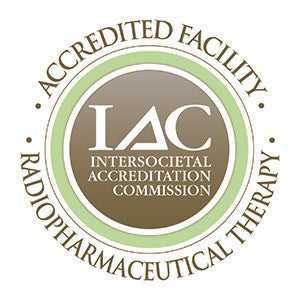210 Theranostics

Community-based theranostics for cancer care
Call to Schedule
919-350-4210Refer a Patient
ReferTheranostics is an advanced approach to cancer treatment. Using radioactive medicine called radiopharmaceuticals, theranostics combines diagnostic imaging and therapy to provide cancer treatment to those who have not responded to hormonal or surgical treatments or who have complex metastases where cancer has spread to multiple sites throughout the body.
Radiopharmaceuticals have two parts: a targeting agent and a radioactive agent. The targeting agent binds to a specific target on the tumor cell surface. Then, the radioactive agent releases energy that either creates images (diagnostic imaging) or destroys cancer cells (therapy). As an extension of 210 PET Imaging, we are one of the only community-based theranostic programs in the region and one of only four programs to receive Radiopharmaceutical Therapy accreditation by the Intersocietal Accreditation Commission (IAC).
210 Theranostics is brought to you by Raleigh Radiology and WakeMed Health & Hospitals.
How it works
Theranostics is a personalized approach to treating cancer, combining state-of-the-art diagnostic capabilities and emerging drug therapies as part of treatment. 210 Theranostics uses the most advanced PET/CT technology available – the Siemens Healthineers Biograph Vision – to detect even the smallest tumors with less exposure to radiation.
If cancer is present and visible on the scan, a radiopharmaceutical is used to treat the tumors. The drug is given as an intravenous (IV) injection or infusion and delivers targeted radiation to kill those cancer cells. Because of its precision, theranostics reduces the risk of harming nearby healthy tissues with fewer, less severe side effects.
Most treatments consist of multiple injections or infusions given several weeks apart with ongoing monitoring by your oncologist and health care provider. Our patient-first approach allows our multidisciplinary teams of nuclear medicine physicians, oncologists, radiologist, nurses and more to treat your cancer effectively and safely without disrupting your quality of life.
What type of cancers can be treated with theranostics?
Several theranostic radiopharmaceuticals are now approved for different types of cancers with additional treatments currently being tested in clinical trials.
However, not every patient is right for theranostics. Your oncologist will determine if theranostics is the right treatment option for you.
Precautions should be taken to limit risks from radiation exposure for the duration of these treatments. Please review the “Before, During & After Treatment” sections of the website for more safety information.
Xofigo (radium Ra 223 dichloride) treats patients with metastatic castration-resistant prostate cancer (mCRPC) that no longer responds to hormonal or surgical treatment that lowers testosterone. It is for men who’s prostate cancer has spread to the bone with symptoms but not to other parts of the body.
Patients receive an IV injection every four weeks for a total of six treatments.
Pluvicto (lutetium Lu 177vipivotide tetraxetan) treats patients with prostate-specific membrane antigen-positive metastatic castration-resistant prostate cancer (PSMA-positive mCRPC) that has spread to other parts of the body (metastatic) and has already been treated with other anticancer treatments.
Patients receive an IV injection every six weeks for up to six treatments, depending on how your body responds.
Lutathera (lutetium Lu 177 dotatate) treats progressive gastroenteropancreative neuroendocrine tumors (GEP-NETs) that are positive for somatostatin, a common hormone produced by the body’s digestive and nervous system.
Treatment consists of four doses, delivered eight weeks apart. You’ll spend most of the day receiving fluids, amino acids (to protect your kidneys and greatly reduce the chance of nausea) and Lutathera through an IV infusion.
